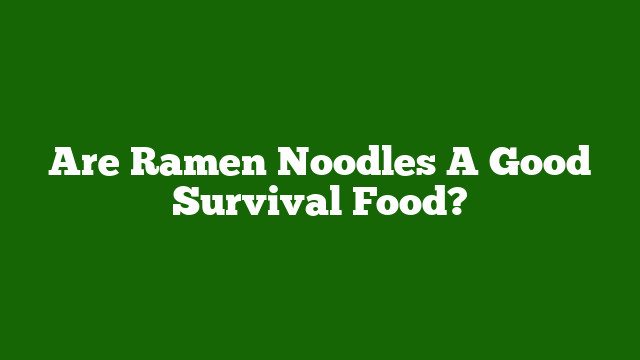Last Updated on June 12, 2023 by Umar
Ramen noodles, particularly instant ramen noodles, are a popular food choice for many due to their affordability, convenience, and ease of preparation.
However, when considering ramen noodles as a survival food, it’s essential to examine their nutritional value, shelf life, and potential health concerns.
Nutritional Value
Instant ramen noodles are made from wheat flour, vegetable oils, and flavorings, and are pre-cooked to shorten cooking time for consumers
A typical serving of instant ramen noodles (half a package) contains approximately 190 calories, 27 grams of carbohydrates, 7 grams of total fat, 3 grams of saturated fat, and 1,330 milligrams of sodium
However, they lack essential nutrients such as fiber, protein, vitamins, and mineralsInstant ramen noodles do provide a good amount of iron, which is necessary for moving oxygen throughout the body and preventing fatigue and anemia.
Shelf Life
Instant ramen noodles have a shelf life of around 2 years, thanks to the preservatives used in their production
Fresh ramen noodles, on the other hand, have a shorter shelf life of about one to two weeks in the refrigerator or up to a month in the freezer
It’s important to note that instant ramen noodles can still be consumed past their best-by date, as long as they are examined for quality and safety.
Health Concerns
While instant ramen noodles are convenient and affordable, they are high in sodium and low in beneficial nutrients
Consuming high amounts of sodium can lead to bloating and water retention, which is not ideal for weight loss or overall health
Additionally, the lack of essential nutrients in instant ramen noodles makes them a less-than-ideal food choice for long-term survival situations.
Alternatives
If you’re looking for healthier alternatives to instant ramen noodles, consider options like BamNut noodles, Moringa noodles, rice noodles, or gluten-free ramen noodles
These alternatives may provide more nutritional value and can be prepared similarly to instant ramen noodles.
Conclusion
Instant ramen noodles can be considered a survival food due to their long shelf life, affordability, and ease of preparation.
However, their high sodium content and lack of essential nutrients make them a less-than-ideal choice for long-term survival situations.
It’s essential to incorporate other nutrient-dense foods into your diet to ensure proper nutrition during survival situations.

